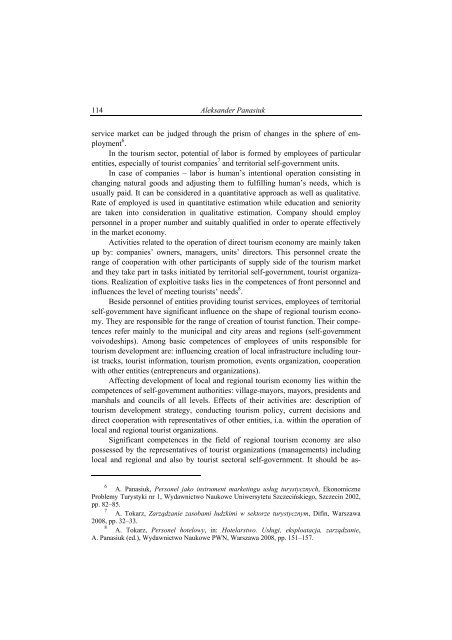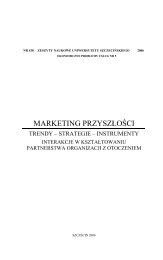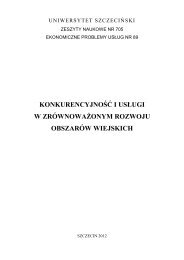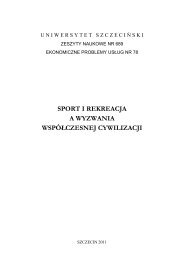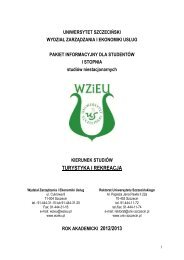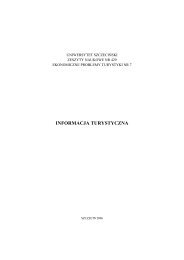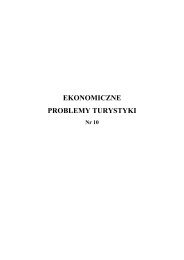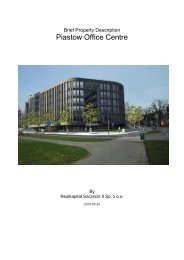Zeszyt naukowy - caÅoÅÄ - WydziaÅ ZarzÄ dzania i Ekonomiki UsÅug
Zeszyt naukowy - caÅoÅÄ - WydziaÅ ZarzÄ dzania i Ekonomiki UsÅug
Zeszyt naukowy - caÅoÅÄ - WydziaÅ ZarzÄ dzania i Ekonomiki UsÅug
You also want an ePaper? Increase the reach of your titles
YUMPU automatically turns print PDFs into web optimized ePapers that Google loves.
114<br />
Aleksander Panasiuk<br />
service market can be judged through the prism of changes in the sphere of employment<br />
6 .<br />
In the tourism sector, potential of labor is formed by employees of particular<br />
entities, especially of tourist companies 7 and territorial self-government units.<br />
In case of companies – labor is human’s intentional operation consisting in<br />
changing natural goods and adjusting them to fulfilling human’s needs, which is<br />
usually paid. It can be considered in a quantitative approach as well as qualitative.<br />
Rate of employed is used in quantitative estimation while education and seniority<br />
are taken into consideration in qualitative estimation. Company should employ<br />
personnel in a proper number and suitably qualified in order to operate effectively<br />
in the market economy.<br />
Activities related to the operation of direct tourism economy are mainly taken<br />
up by: companies’ owners, managers, units’ directors. This personnel create the<br />
range of cooperation with other participants of supply side of the tourism market<br />
and they take part in tasks initiated by territorial self-government, tourist organizations.<br />
Realization of exploitive tasks lies in the competences of front personnel and<br />
influences the level of meeting tourists’ needs 8 .<br />
Beside personnel of entities providing tourist services, employees of territorial<br />
self-government have significant influence on the shape of regional tourism economy.<br />
They are responsible for the range of creation of tourist function. Their competences<br />
refer mainly to the municipal and city areas and regions (self-government<br />
voivodeships). Among basic competences of employees of units responsible for<br />
tourism development are: influencing creation of local infrastructure including tourist<br />
tracks, tourist information, tourism promotion, events organization, cooperation<br />
with other entities (entrepreneurs and organizations).<br />
Affecting development of local and regional tourism economy lies within the<br />
competences of self-government authorities: village-mayors, mayors, presidents and<br />
marshals and councils of all levels. Effects of their activities are: description of<br />
tourism development strategy, conducting tourism policy, current decisions and<br />
direct cooperation with representatives of other entities, i.a. within the operation of<br />
local and regional tourist organizations.<br />
Significant competences in the field of regional tourism economy are also<br />
possessed by the representatives of tourist organizations (managements) including<br />
local and regional and also by tourist sectoral self-government. It should be as-<br />
6<br />
A. Panasiuk, Personel jako instrument marketingu usług turystycznych, Ekonomiczne<br />
Problemy Turystyki nr 1, Wydawnictwo Naukowe Uniwersytetu Szczecińskiego, Szczecin 2002,<br />
pp. 82–85.<br />
7<br />
A. Tokarz, Zarządzanie zasobami ludzkimi w sektorze turystycznym, Difin, Warszawa<br />
2008, pp. 32–33.<br />
8<br />
A. Tokarz, Personel hotelowy, in: Hotelarstwo. Usługi, eksploatacja, zarządzanie,<br />
A. Panasiuk (ed.), Wydawnictwo Naukowe PWN, Warszawa 2008, pp. 151–157.


